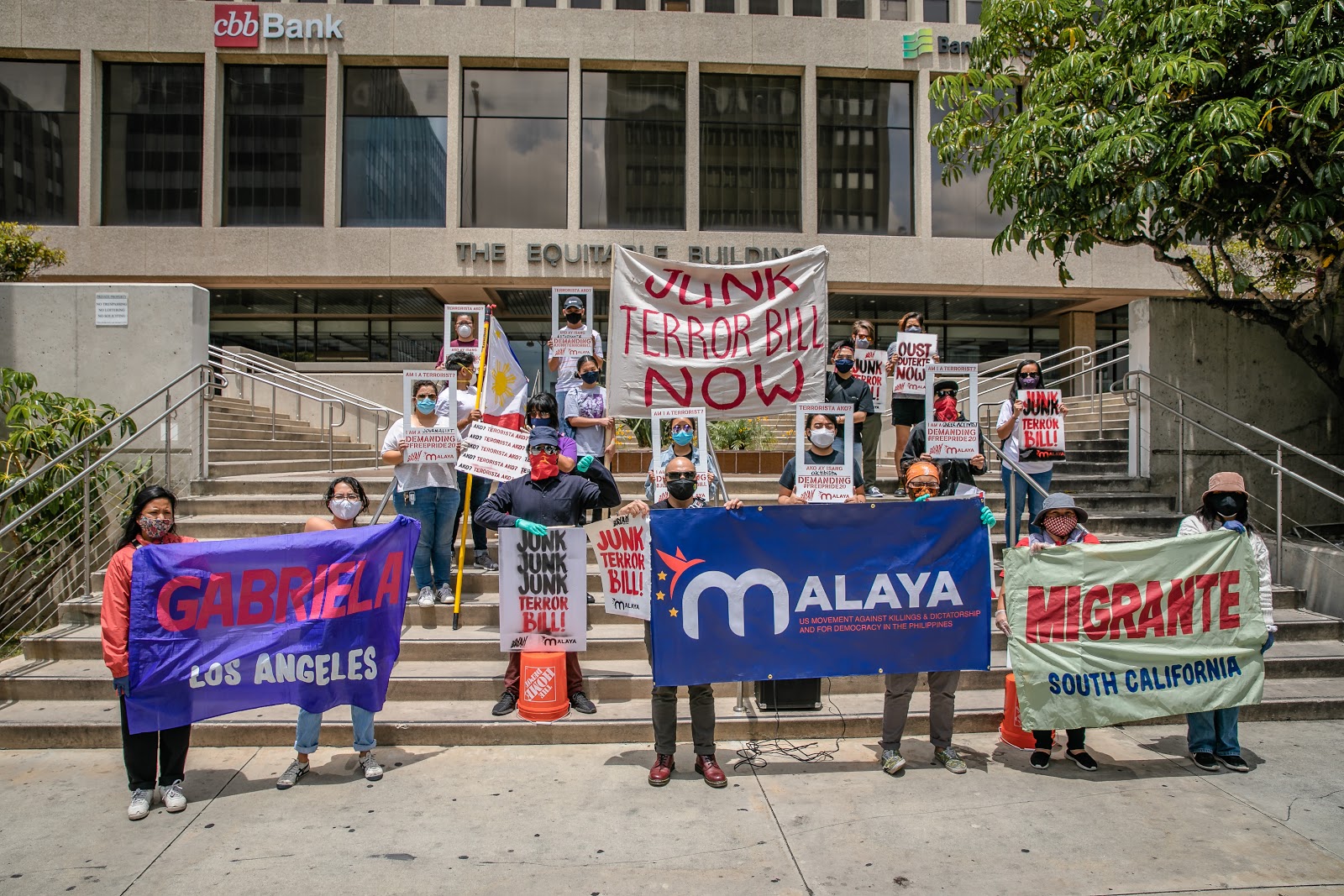
By Ritchel Mendiola and Rae Ann Varona / AJPress
PHILIPPINE President Rodrigo Duterte has signed the controversial anti-terrorism bill into law on Friday, July 3, despite local and international concerns about the measure’s potential effects on free speech and opposition in the country.
Presidential Spokesperson Harry Roque and Executive Secretary Salvador Medialdea confirmed the signing, a day after Malacañang said the bill was under final review at the Office of the Executive Secretary.
“Terrorism, as we often said, strikes anytime and anywhere. It is a crime against the people and humanity; thus, the fight against terrorism requires a comprehensive approach to contain terrorist threats,” Roque said in a statement.
Under the Anti-Terrorism Act of 2020 — which expands on the Human Security Act of 2007 — incitement of terrorism can be done “by means of speeches, proclamations, writings, emblems, banners or other representations…without taking any direct part in the commission of terrorism.” Those arrested and detained may be held for 14 to 24 days.
“The signing of the aforesaid law demonstrates our serious commitment to stamp out terrorism, which has long plagued the country and has caused unimaginable grief and horror to many of our people,” the spokesperson added.
Proponents of the bill say that the intent is to end terrorism in the Philippines where communist and Islamic insurgencies are still extant. They add that terrorist activities have been frequent even amidst the COVID-19 pandemic.
Philippine Senator Panfilo Lacson, a former police chief, previously said that the preceding Human Security Act allowed a “total of 20 instances where law enforcers can be charged and penalized for violations,” compared to only four instances for terrorists to be prosecuted.
The new law enables the suspected “terrorist” to also be placed under surveillance for 60 days, extendable by up to 30 more days, by the police or the military.
Acts punishable under the law include:
- Engaging in acts intended to cause death or serious bodily injury to any person, or endangers a person’s life;
- Engaging in acts intended to cause extensive damage or destruction to a government or public facility, public place, or private property;
- Engaging in acts intended to cause extensive interference with, damage, or destruction to critical infrastructure;
- Developing, manufacturing, possessing, acquiring, transporting, supplying or using weapons; and
- Releasing of dangerous substances, or causing fire, floods or explosions.
Any person who proposes, incites, conspires, participates in the planning, training, preparation, and facilitation of a terrorist act, as well as those who will provide material support to terrorists and recruit members in a terrorist organization, will also be penalized by life imprisonment without the benefit of parole.
Meanwhile, anyone who threatens to commit terrorism, and those who propose any terroristic acts or incite others to commit terrorism, will suffer imprisonment of 12 years.
This goes the same for anyone who voluntarily and knowingly joins any organization, association or group of persons knowing that such is a terrorist organization.
International alarm
Outside the Philippines, many have joined in on criticizing the bill by participating in protests both outside and online under the hashtag #JunkTerrorBill.
“The approval of this law grants the government excessive and unchecked powers. Legislation aimed at ‘countering terrorism’ must ensure respect for international human rights and humanitarian law and protect basic liberties,” Amnesty International’s Asia-Pacific Regional Director Nicholas Bequelin said on Friday. “This law’s introduction is the latest example of the country’s ever-worsening human rights record. Once again, this shows why the UN should launch a formal investigation into ongoing widespread and systematic violations in the country.”
Resources and card site links have been widely shared, providing links to contact information of Philippine representatives, updates, email protests and petitions, relevant tweets and threads, and donation drives. A Telegram page linked to junkterrorbill.carrd.co had 5,407 members as of Thursday, July 2.
Even American singer-songwriter Taylor Swift posted a link to an online “Junk Terror Bill” petition.
A day after the anti-terrorism bill was passed in Congress, a United Nation rights official described the bill as “very worrying.”
Ravina Shamdasani, a spokesperson for the UN High Commissioner on Human Rights, said that in using a broad definition for terrorism, the provisions used in designating people as terrorists “may violate the principle of legality under international law.”
“You add to this the context in the Philippines where a lot of human rights organizations are routinely labeled as terrorists, this is very worrying,” said Shamdasani in an online news conference.
In a 26-page report on human rights violations and impunity in the Philippines, UN High Commissioner for Human Rights Michelle Bachelet said the “vague definitions in the Anti-Terrorism Act may violate the principle of legality.”
On June 30, she urged Duterte to “refrain from signing” the bill, adding that it “heightens concerns about the blurring of important distinctions between criticism, criminality, and terrorism.”
“The law could have a further chilling effect on human rights and humanitarian work, hindering support to vulnerable and marginalized communities,” said Bachelet. “I would urge the president to refrain from signing the law, and to initiate a broad-based consultation process to draft legislation that can effectively prevent and counter violent extremism — but which contains some safeguards to prevent its misuse against people engaged in peaceful criticism and advocacy.”
Phil Robertson, deputy Asia director at Human Rights Watch described the bill as a “human rights disaster in the making.”
“The law will open the door to arbitrary arrests and long prison sentences for people or representatives of organizations that have displeased the president,” said Robertson.
Proponents of the law have responded to such criticism by saying that the right to protest are protected under law so long as protestors do not “create a serious risk of public safety.”
However, those critical of the law have pointed out that the group responsible for making the decision — the Anti-Terrorism Council — is comprised of one government agency head and eight members of Duterte’s cabinet.
“The new counterterrorism law could have a horrific impact on basic civil liberties, due process, and the rule of law amid the Philippines’ shrinking democratic space,” said Robertson. “The Philippine people are about to face an Anti-Terrorism Council that will be prosecutor, judge, jury, and jailer.”
The Carnegie Endowment for International Peace likened to the bill to similar ones passed in other countries.
Most recently, Indonesia passed an anti-terror bill in 2018 and has not experienced mass arrests of critics or journalists. However, citizens of other countries like Egypt, Ethiopia, and Turkey have been subjected to abuse of power through antiterrorism laws that have jailed large numbers of opposition politicians, journalists, and citizen protesters.
In Ethiopia, for example, a similar law passed in 2009 was used to jail opposition members, journalists, and peaceful political activists.
“As the Philippines marches over closer to rule by law, world leaders preoccupied with the pandemic must speak out and stay vigilant to save Filipino democracy,” wrote Aaron Sobel, the article’s author.
In San Francisco, California, a rally of about 40 people was held outside the Philippine Consulate General to demand Duterte veto the bill.
“Since Duterte became the president of the Philippines back in 2016, he has been waging terror on the Filipino masses on his War on Drugs, Martial Law in Mindanao, and his militarized approach to the current pandemic to name a few,” said Angela Santelices, Community Outreach Coordinator of Anakbayan San Francisco, a youth-led organization that was at the rally. “It is painfully clear that Duterte’s interests are to control our communities, not to help.”
Nate Roque, the External Chairperson for Northern California Pilipinx American Student Alliance (NCPASA), said that the push for the bill during the coronavirus pandemic was a clear indicator of the Philippine government’s lack of priority over citizen health.
Referring to the recent arrests of protesters, he added, “This bill is a direct attack to human rights. Sadly, within the last few days, students were attacked and unlawfully arrested because they were protesting. This isn’t how a government should treat their people.”
Joemae Santos, Regional Coordinator of MALAYA Movement San Francisco, another youth-led movement in attendance at the San Francisco rally stated: “The Anti-Terror Bill is a blatant attack on our basic human democratic rights. It seeks to punish all forms of dissent through trumped up charges and imprisonment. The bill grants supreme authority to the government and will allow them to label anybody as a terrorist.”
Also this week, a rally was held outside the Philippine Consulate in Los Angeles to not only raise awareness about the bill, but also the security alliance between the Philippines and the U.S. (Since 2016, the U.S. has given close to $550 million in defense assistance to help the Armed Forces of the Philippines’ modernization program.)
“Something sinister is happening here,” Malaya Movement Southern California Coordinator Audine Tayag stated. “The Philippines continues to use increased militarization and violence against everyday people rather than addressing their basic needs, and this is backed by U.S. funding.”








